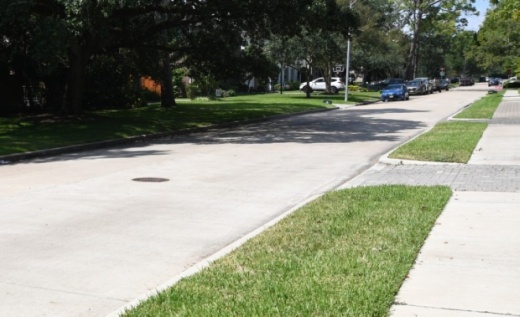The city of Bellaire’s financial assessment of the proposed sidewalk charter amendments suggests they could add up to $17.65 million in construction and planning costs for potential projects—but the estimates vary widely.
The estimates were developed on a block-by-block basis by the city engineer, which the city then multiplied across its inventory of sidewalks to estimate a potential citywide effect. The high-end cost estimate would only be realized if all propositions pass and if all of Bellaire’s 547 incomplete sidewalk blocks were outfitted with sidewalks on both sides of the street, though no current plans call for that scale of work.
“Estimating the anticipated fiscal impacts of the three proposed charter amendments isn’t all that simple,” Bellaire Mayor Andrew Friedberg wrote in a blog post announcing the release of the report Oct. 13. “I’m sure there are countless other scenarios and variations that could come up that haven’t been thought of or addressed.”
Bellaire voters will only see the per-block cost estimate when they vote on the propositions. Early voting began Oct. 13.
In the assessment of Proposition A, which would require six-month notice of a sidewalk project, including design details and a new hydrological study requirement, the city engineer referred to project costs from recent bond-funded contracts. The engineer's assessment determined the cost of lost design fees for sidewalks would be $1,975-$5,025 per block, or up to about $2.75 million if applied citywide.
However, "if design costs were not lost, the fiscal impacts for design would be $0,” the city assessment reads.
Proposition B, which would require 50% of residents of an affected block to approve a project, is estimated to add $500 in costs per sidewalk block, or $136,000 to $273,500 citywide, to cover the mailings and coordination with residents and property owners.
Meanwhile, estimates for Proposition C’s citywide effect range from $1.22 million to $11.49 million, accounting for additional costs that may be incurred “if the decision were to be made to address the increase in impervious cover from the addition of sidewalks, above and beyond the minimal offset requirements,” according to the report. However, on the ballot, the fiscal impact for Proposition C is listed as zero, but it also notes the potential for $4,500-$21,000 in "add on" costs per block.
The city’s fiscal impact supplement was published Oct. 13 along with the official notice of election.





